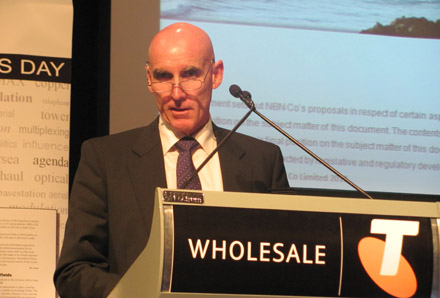Stop playing the bribery card, Turnbull

commentary Shadow Communications Minister Malcolm Turnbull launched directly into a precise and highly targeted personality attack on NBN Co chief executive Mike Quigley, who appeared before yesterday morning's Sydney meeting of the Federal Parliament's joint committee on the National Broadband Network (NBN).

NBN Co chief executive Mike Quigley (Credit: Josh Taylor/ZDNet Australia)
Turnbull, it appeared, had examined with a fine-tooth comb Quigley's previous statements about his lack of involvement in the allegations of bribery and corruption at his former employer and current NBN supplier, Alcatel-Lucent, and compared them with tiny details recently released in a series of disclosures by the company to the US Securities and Exchange Commission (SEC).
Over a fraught series of exchanges with Quigley, Turnbull extracted from the NBN Co chief executive a series of acknowledgements that he had spoken "too loosely" in the past with respect to the investigations by the SEC and the US Department of Justice into Alcatel-Lucent.
Quigley had said that he had no jurisdiction over Costa Rica, whose government was said to have been plied with bribes for contracts, due to information he had been given from a former colleague. However, he found out later that he did in fact have jurisdiction over the country. Quigley also adjusted what he'd said about which organisation had brought the issues to light.
As has been widely reported in the past 24 hours, Quigley was forced to apologise about his errors.
Now, if you believe Turnbull, there is no witch hunt being conducted with respect to the NBN Co chief executive. "Nobody is making any allegations against you, least of all anybody here," Turnbull told Quigley yesterday, noting he just wanted to give the executive the chance to "correct" some of the statements he had made.
However, nothing could be further from the truth.
The fact of the matter is that Turnbull has latched on to ongoing speculation by a small number of media outlets about a potential link between Quigley and what went on at Alcatel-Lucent half a decade ago to launch a considered and deliberate campaign against the NBN Co chief. Turnbull's attempting to undermine and ultimately destroy Quigley's personal credibility as the man responsible for implementing Labor's flagship NBN policy.
As Quigley has repeatedly stated, there is no evidence of any link between the executive and the bribery scandal in Latin America which has led Alcatel-Lucent into a $130 million settlement with the US Government. The US investigators were so convinced of this fact, they had no interest in speaking with Quigley or NBN Co finance chief Jean-Pascal Beaufret, who was also high up in Alcatel-Lucent at the time.
Yet the constant moves by Turnbull and other members of the Coalition and the media to bring up the issue in connection with Quigley speaks of a desire to create that link in the minds of the public.
Turnbull's carefully considered attack on Quigley yesterday was calculated precisely to take advantage of his own sky-high media profile and tarnish Quigley's personal and professional reputation by forcing him to acknowledge in public that he was wrong.
It matters not to Turnbull, it would seem, nor to most of the media, that the issue on which he forced Quigley to correct himself and apologise for was an issue that, as Quigley pointed out yesterday, he could not be expected to know anything about, as it was half a decade in the past and it was something in which he had no involvement.
But it matters to me.
When Quigley was appointed to the role in 2009, ZDNet Australia conducted an investigation of his background, speaking to telco executives and industry experts but could not find anyone to say a bad word against him.
As the profile of the man emerged, it became clear he was well-respected as an intelligent and capable leader, a man who stayed true to his Australian roots yet had emerged on the global stage. It was perhaps also true that Quigley was disappointed not to have risen to the chief executive role at Alcatel-Lucent — yet he appeared to have borne that disappointment humbly, and has been content to work in lesser roles.
Quigley is also a survivor of life-threatening illnesses that many in similar positions would have succumbed to — as well as a family man and a loyal supporter of other Australians in Alcatel-Lucent when he was there.
In the many times I have seen the executive in action — whether it be at a press conference or doorstop interview, watching him being questioned in Senate Committees, or even in televised interviews or live speeches, I have never seen Quigley lie; I have never seen him tell half-truths in order to placate his audience, and I have certainly never seen him evade a question.
There have been times when he could not give his audience satisfaction in his answers; for example, when he was precluded from doing so by tendering regulations, privacy legislation or even the necessity of not slandering important NBN stakeholders such as ministers, customers and regulators. On these occasions he has explained clearly why he could not disclose all of the information that he might like to. It's called "professionalism".
Overall, Quigley has been nothing less than honest and straightforward in all of his public dealings — more so than almost any other high-profile executive, politician or bureaucrat in my experience, with the exception of a handful.
It is completely legitimate to debate the merits of the NBN policy; but it is not legitimate to link an innocent man with bribery and corruption charges simply to serve those ends. As Australians, we should be ashamed to do so, and we should not tolerate the vilification and defamation of an honourable man in this fashion.